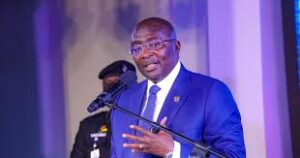Election 2024: Bawumia’s Early Concession Was ‘Reckless Populism’ – Gbande Criticizes Move

Deputy General Secretary of the National Democratic Congress (NDC), Mustapha Gbande, has sharply criticized Dr. Mahamudu Bawumia for what he described as a premature and politically dangerous concession following the 2024 presidential election. According to Gbande, the New Patriotic Party’s (NPP) flagbearer acted out of populist motivations rather than in the national interest when he publicly accepted defeat before the official results were fully declared.
Speaking in a radio interview on Tuesday, Gbande argued that Dr. Bawumia’s decision to concede early was not a demonstration of maturity or democratic goodwill—as some have praised it—but a calculated political move that could have had serious implications for Ghana’s democratic process.
“It was a reckless and populist act. At that point, the Electoral Commission had not completed the collation of results, and yet Dr. Bawumia took it upon himself to concede. What if the final numbers had turned in his favor? What would that have meant for the legitimacy of the results?” Gbande questioned.
The NDC executive claimed that such a hasty concession, while perhaps earning Bawumia applause in the media and among some members of the public, could have dangerously undermined confidence in Ghana’s electoral system had the results later shifted or been contested.
Gbande warned that public figures, especially presidential candidates, must act with caution and responsibility during election periods, particularly when tensions are high and the nation’s political stability is at stake.
“Leaders must think beyond optics and media headlines. Politics isn’t just about gaining praise in the moment—it’s about making decisions that protect the integrity of institutions and the will of the people,” he added.
Dr. Bawumia, who served as Vice President under the Akufo-Addo administration, officially conceded defeat just 24 hours after the polls closed in December 2024. In a televised address, he congratulated the President-elect, former President John Dramani Mahama, and urged supporters of the NPP to remain peaceful and united.
His concession drew praise from some civil society groups, religious leaders, and political analysts who hailed it as a sign of democratic maturity and statesmanship. However, voices like Gbande’s are now challenging that narrative, suggesting the move may have had more to do with political image-making than genuine democratic principle.
Gbande also hinted that the early concession may have been a strategy to avoid internal backlash within the NPP, where Dr. Bawumia faced challenges during his candidacy, especially from factions that had supported other contenders in the primaries.
“Maybe it was easier for him to concede quickly than to face tough questions from his own party after a more thorough and contested process,” Gbande speculated.
He further emphasized that while conceding defeat peacefully is a crucial part of any functioning democracy, the timing and manner of such announcements must align with due process and the official work of the Electoral Commission.
The NDC, which returned to power following Mahama’s victory in the tightly contested election, has continued to emphasize the need for institutional reform, electoral transparency, and what it calls a more “principled and accountable” political culture.
Gbande concluded his remarks by urging all future candidates, regardless of party, to prioritize Ghana’s democratic institutions over personal or party agendas.
“Let us not normalize premature actions that can disrupt the process, even if they appear noble on the surface,” he said.
As Ghana reflects on another peaceful election cycle, the debate around Bawumia’s early concession highlights broader questions about political conduct, electoral integrity, and the fine line between statesmanship and symbolism.






